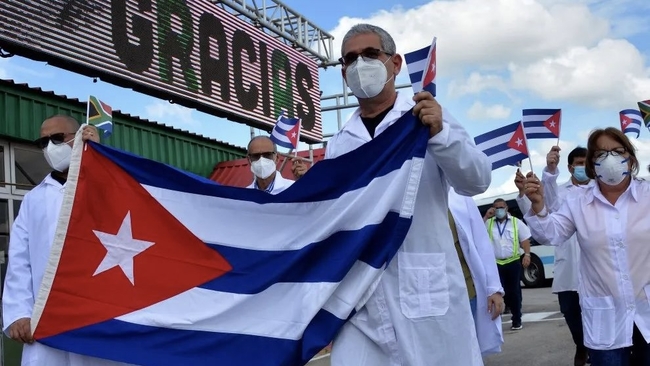The US increases pressure on Cuba by targeting its medical brigades
Peoples Dispatch | Thursday, 21 August 2025 | Click here for original article

Cuban doctors who participated in internationalist medical missions. Photo: MINSAP Cuba
Secretary of State Marco Rubio stated that he will sanction officials who have facilitated the implementation of the Cuban brigade program. Cuba has asserted the program will continue.
On August 13, the United States launched another attack on Cuba. US Secretary of State Marco Rubio announced that his country would impose visa restrictions on officials from Brazil, Grenada, and African countries who hire or have hired Cuban medical brigades.
According to Rubio, the work of Cuban doctors working in other countries is “forced labor”. The decision is part of a tightening of measures against the Caribbean island, which are in addition to the economic and commercial blockade imposed on the island as a means of punishment against the revolutionary process that began in 1959.
“Today, the State Department took steps to impose visa restrictions on officials from the African, Cuban, and Grenadian governments, and their families, for their complicity in the Cuban regime’s medical mission plan,” Rubio said.
Among those recently sanctioned are several former members of the Pan American Health Organization (PAHO) “for their complicity in the regime’s medical mission plan”.
Cuban medical brigades
Cuban medical brigades date back to the 1960s. One of the first missions was sent to Algeria after independence from France, due to the flight of dozens of French doctors. In recent years, Cuban doctors have been recognized for their collaboration with dozens of countries across the world during the COVID-19 pandemic, even European countries like Italy.
Cuban medical brigades, comprising doctors, nurses, and other healthcare professionals, have successfully treated hundreds of thousands of patients worldwide who would otherwise have been left untreated. In return, Cuba, after paying the doctors their due salaries, receives a certain amount of money from the countries where its specialists work.
As reported by Cuba Debate, “More than 24,000 healthcare workers are currently providing services abroad as part of solidarity missions, some of which are completely free of charge and others remunerated for the services provided.”
The program is one of the few sources of foreign income for the island of Cuba due to the US economic blockade. In this way, the Trump administration seeks to further stifle the Cuban economy by threatening other countries for hiring the services of Cuban doctors.
For its part, the Cuban government announced that, despite the difficulties, it will not cancel the medical missions program. Cuban Foreign Minister Bruno Rodríguez said on X: “The US Secretary of State is threatening visa restrictions against governments that have legitimate medical cooperation programs with Cuba. [This decision] demonstrates the imposition and aggression by force as the new foreign policy doctrine of that government. Cuba will continue to provide services.”
Is the decision also directed against Brazil?
In the case of Brazil, the sanctions also affected the relatives of officials who worked at PAHO and who entered into agreements with the “Más Médicos” program offered by the Cuban government.
In addition, Washington revoked the visas of Mozart Julio Tabosa Sales and Alberto Kleiman, as confirmed by Rubio, due to their role in implementing the program during their time at the Brazilian Ministry of Health. During this time, Cuban doctors treated patients in remote areas of the country where the Brazilian government was unable to do so.
Journalist Jesús Esquivel reported that the decision should be understood in the context of tensions between Brasilia and Washington: “The context of these actions against Brazil has to do with the legal proceedings … against Jair Bolsonaro, former president of the South American giant, an acolyte of Donald Trump and admirer of the US president. We have already seen that Trump, through tariffs, has tried to punish the Brazilian government for this legal process against Trump’s friend.”
Thus, Washington is striking at its old enemy while increasing pressure on Brazil, which it has been trying to hit since the tariff dispute between the two countries began. Washington imposed 50% tariffs on Brasilia because of the trial against Jair Bolsonaro in that country, as well as the growing economic relationship between the South American country and China. The response of Brazilian President Lula da Silva’s government was to impose 50% tariffs on US products, which has not gone down well in Washington.






